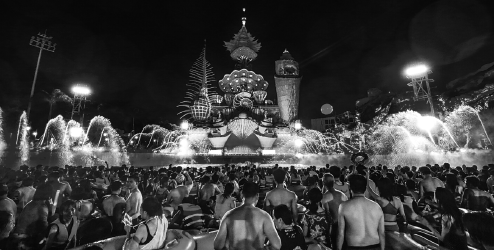GROWING TOURISM
China has opened nearly 20 theme parks since the pandemic, Yang Feiyue reports.

China's theme park industry continues to expand amid the COVID-19 pandemic, according to a report.
Codeveloped by the global infrastructure consulting firm AECOM and the Los Angeles-based Themed Entertainment Association, the report says in the Asia-Pacific region, the top 20 theme parks saw visitor numbers drop a total of 58 percent in 2020. The impact on China has been different than in other parts of Asia.
The country was the first to implement restrictions and closures. Nonetheless, new parks and attractions continued to open even through the pandemic, though with some delays, says Beth Chang, executive director of Economics at AECOM's Asia-Pacific operations.
China added nearly 20 theme parks in the interim, including the Universal Beijing Resort that opened in September. Companies such as Overseas Chinese Town and Fantawild opened new parks, while Chimelong Paradise expanded. Ocean Park Hong Kong opened a new year-round water park called Water World.
The OCT Group moved ahead with its expansions and additions in 2020, including a new Happy Valley theme park in Nanjing, Jiangsu province, and three new water parks in Nanjing, Shunde in Guangdong province and Xiangyang in Hubei province, and several small attractions, including an observation wheel, also in Shunde.
Last year, Fantawild opened a new Oriental Heritage park in Mianyang, Sichuan province. The Fantawild Oriental Heritage Park in Jingzhou, Hubei, was recently honored with Thea Award for the live show Qu Yuan, a second Thea honor for the theme park operator.
Parks in China saw a first wave of closures last year in late January and the first reopened by late March at about one-third capacity, while the country gradually returned to somewhat business as usual. Last year, domestic air travel and high-speed rail operated at about 90 percent of normal capacity and outdoor scenic areas and parks did well, with people seeking open, outdoor activities. Bookings to theme parks in the first six months of 2021 increased by 85 percent as compared with the same period in 2019, according to China's major online travel agency Trip Group.
"Theme parks have remained one of the most popular choices," says Liu Fangtong, a senior publicity officer at trip.com.
This year, four theme parks, including Universal Beijing Resort, Chimelong and Shanghai Disney Resort, made their way to the top five sites among travelers during the Mid-Autumn Festival holiday from September 19-21, according to Liu. Universal Beijing Resort, which opened on Sept 20, had previous bookings for tickets.
Some parks were able to sustain higher attendance numbers as they were already oriented to local markets, Chang says.
Fantawild parks are primarily targeted to local audiences, with a focus on themes such as local culture and history. Chimelong Paradise in Guangzhou saw the best returns of the group, and also opened a new show and theme area in 2020.
Disney demonstrated an optimism about the future. The Shanghai Disney Resort, which is celebrating its fifth anniversary in 2021, announced another admission price increase that is going to take effect in January 2022. Shanghai Disney has also planned an expansion, with an under-construction area based on Zootopia. Development of a new, Frozen-themed land at Hong Kong Disneyland is also underway.
"Those moves reflect Disney's confidence in its operations in China, as well as the company strategy to keep growing per-visitor revenue," Chang says.
In a situation such as the current pandemic, people are limiting the time they spend outdoor and the decision to visit a theme park is not made lightly.
"People do want to get out, to gather with friends and family, to enjoy time outdoors-but they will look for high-quality options," she says, adding that quality parks are able to stand more firmly on price, and their revenues will recover more quickly.
The establishment of Universal Beijing Resort, and the ongoing expansion of Shanghai Disney Resort, continue an upward trajectory for the industry, and reinforce the notion of quality entertainment for parks in China and Asia, raising the bar in the use of technology and media and leading other parks and all sorts of attractions to follow suit, the report says.
"Universal Beijing Resort has also set an exemplary standard in being the first LEED-certified theme park in the world," Chang says. "As China pushes to reduce greenhouse gas emissions and cut its carbon footprint, we will see more innovation of this kind, moving toward reduced energy consumption and more sustainable development with less waste."
Moreover, water parks that were allowed to open in China by May were pretty much able to capture summer tourism, though with limited capacity and the need to address guests' hygiene concerns.
The Atlantis Sanya resort water park in Hainan province had essentially no loss of attendance this year. It has drawn affluent Chinese guests who weren't able to travel overseas.
Various strategies and fresh approaches are being employed to help water-themed parks perform better in the new conditions.
The government is promoting the "nighttime economy" to help stimulate domestic demand. Many attractions have added evening activities this year, including water parks that traditionally avoided operating at night. The new OCT Shunde water park has had success offering nighttime ticket discounts, drawing as much as three-quarters of the day's attendance and giving guests the opportunity to experience the park without the intense summer heat.
Some water parks are incorporating electronic dance music to night activities to attract younger visitors.
According to the report, there is a "new wave of boutique water parks", as resort amenities cater to increased demand for short-distance, regional travel and staycation options. The medium and small water parks are being packaged with on-site hotels.
"This trend, which began a few years ago, aligns with guests' needs in the pandemic time and we expect to see a lot of development in future," Chang says.
People from Generation Z, born between the mid-1990s and the early 2010s, have gradually become the major force behind tourism consumption, and they want diverse and high-quality theme park products, says Li Yi, vice-president of OCT's tourism research institute.
"The (OCT) theme parks will further improve quality, enrich tourists' entertainment experience and improve satisfaction levels via continuous innovation, renovation and upgrades," Li adds.
The development of China's digital economy will promote the diversification of products, better services and smarter management in tourism.
"Domestic theme parks are expected to accelerate intelligent construction, upgrade online functions such as reservation and timeshared control, and use scientific and technological means to create new amusement equipment to improve tourist involvement and experience," Li says.



Today's Top News
- Xi congratulates Jose Antonio Kast on election as Chilean president
- China urges opposition to Japanese official's remarks about possessing nuclear weapons
- Ukraine says latest peace talks with US, Europe 'productive'
- Asia's rise and Europe's structural decline
- Economic stability a pillar of China's national security
- Xi taps China's deep wisdom for global good






























